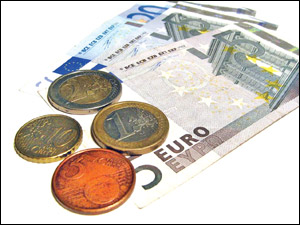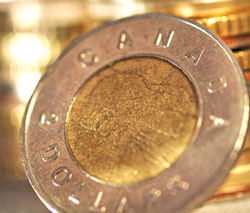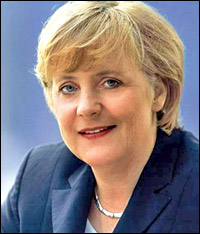Financial speculators still causing havoc
Martin Khor
Recently there have been reports on the new speculative activities of
hedge funds which are said to have betted against the credit-worthiness
of crisis-hit Greece, and against the value of the euro.
|

The pound rising higher than ever |
Political leaders in Europe are now attacking the role of hedge funds
and other financial speculators, while the European Commission is
investigating their activities with a view to tightening regulation.
The role of derivatives, and especially the credit default swaps, is
also coming under attack, as these are found to be among the most potent
speculative instruments.
|

Money Money Money |
What is really surprising is that action against the speculators and
the mechanisms they use has not yet been taken until now.
It was financial speculation, with the use of instruments such as
securitisation of debts and credit derivatives, that lay the ground for
the Western and global financial crisis that almost torpedoed the world
economy.
Despite the enormous harm they have caused, many of the speculators
and the instruments have been allowed to continue their trade.
The reason for this, according to many analysts, is that the
financial institutions, tycoons and their lobby groups wield enormous
influence over political leaders, and partly because of the
contributions they make to the political parties, especially in the
United States.
In the Asian crisis that started in 1997, Malaysia and Thailand
pointed to the hedge funds as a major cause of the speculative bout that
caused the collapse of currencies. Malaysia then highlighted the
enormous leverage the hedge funds commanded, that they could borrow 50
dollars for each dollar of capital they had, and this gave them such
power to sway and manipulate the markets.
The International Monetary Fund was requested to study the role the
hedge funds played, but it declared their role was minimal, a conclusion
reached by not understanding the leverage enjoyed by these institutions
and their further power through the use of derivatives.
|

Every penny keeps getting saved |
The speculators were given free rein, and they enormously expanded
their activities and range of instruments in the decade following the
Asian crisis until the speculation based on securitisation of US
mortgages triggered an even bigger crisis.
Unfortunately, the process to reform the financial sector has
stalled, and little action has been taken to discipline the hedge funds
and the derivatives. Thus new manifestations and forms of speculation
have now hit Europe when it is in a most vulnerable state.
The hedge funds are now accused of preying on Greece by engaging in
the trade in credit default swaps in the expectation that Greece will
have problems in meeting its debt payments.
More recently, the hedge funds are said to be short-selling the euro,
in the expectation that the crisis in Greece and the weakness of other
countries like Spain, Portugal and Ireland would cause the euro to
either weaken or even collapse.
The Independent of London reported last week that “gigantic bets
against the euro have fuelled rumours of a hedge fund plot to cash in on
the Greek crisis” and on “fears of a hedge fund conspiracy to destroy
the euro”.
|

German Chancellor
Angela Merkel |
Its 4 March article said the value of the “bets” made by hedge funds
and others against the European currency has reached more than $12
billion, almost double the amount of a few weeks ago, and the number of
credit default swap (CDS) contracts made to the same effect has also
soared. Many CDSs, which are an insurance against the risk of default by
a debtor, have been taken out by those with no ownership of the
underlying asset, such as Greek government bonds, in what is termed as
“naked” CDS trading.
According to another Independent article: “CDSs are a type of
insurance taken out when an investor is concerned about risk of default.
At the moment, for example, the premium to insure 10 million euros of
Greek government securities is 428,000 euro. ‘Naked’ shorting via the
CDS market takes place where the trader does not own the underlying
security, likened to taking out life insurance on other people, with
similar homicidal intent.”
It is quite incredible that just a year or two following the
near-collapse of the world financial system and the pledges made by the
leading Western countries to tighten financial regulation, new forms of
speculation and manipulation have been allowed to take place, with such
adverse effects in Europe.
Some action is now being explored. The European Union’s new Internal
Market Commissioner, Michel Barnier, plans to investigate the
short-selling of the euro and the abuse of the credit default swaps
market. He has the authority to act as he is now drafting an EC
directive on “alternative investment fund managers”, which is supposed
to regulate hedge funds and others.
Chairman of the UK Financial Services Authority Lord Turner has also
criticised naked CDSs, saying “there are questions as to whether you
should be allowed to take out an insurance contract where you don’t have
an insurable interest.”
|

Dollar going up and down |
Finally, the Greek government banned hedge funds from being allocated
any of the 5 billion euros of bonds that it offered last week. At a
meeting in Berlin, the German Chancellor Angela Merkel and Greek premier
George Papandireou announced they would push the EU and the G20 to
contain speculative instruments, such as credit default swaps,
especially if the speculation is against states.
Now we have new outstanding examples of financial speculation
undermining a country (Greece) and a major currency (the euro), and also
new pledges by important political leaders to act against speculators
and their instruments.
More than a decade after simpler forms of speculation undermined the
currencies and economies of many East Asian countries, and two years
after the eruption of the current global crisis, it still remains to be
seen if action will be taken to curb the speculative mania.
Or would it take yet another and more gigantic financial crisis
before speculation is finally banned?
-Third World
Network Features
(The writer is
Executive Director of the South Centre, an intergovernmental policy
think-tank of developing countries, and former Director of the Third
World Network). |



